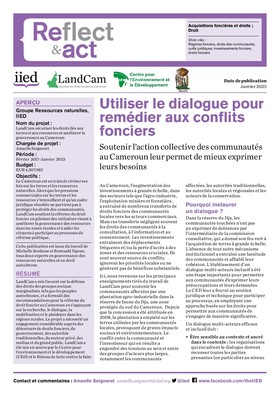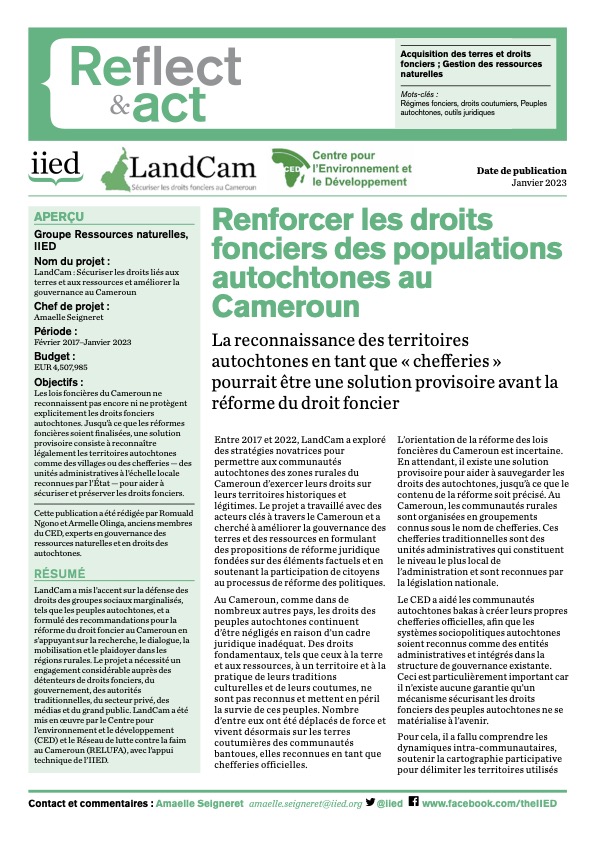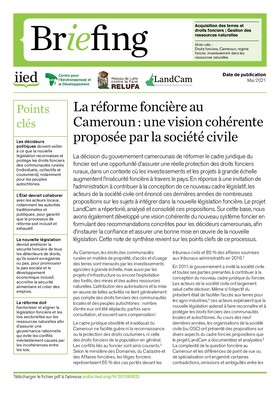Location
RELUFA works in Cameroon with local communities through Capacity buildings, Conducting Studies and restitution of recommendations to stakeholders, Mobilization of affected local communities and CSOs.
RELUFA has as mission to combat systemic problems generating poverty, hunger and economic, social and environment injustices. This is done through two programs : Extractive Industries, Land and Food Justice
Programs
- Extractive Industries
In this program, RELUFA has identified as objectives:
- To ensure that the extractive sector in Cameroon contributes to the development of local communities;
- Ensure that national and local governments manage the natural resources of Cameroon in a transparent, fair and responsible manner.
To achieve these objectives, RELUFA:
- Conduct monitoring and advocacy on issues raised by the host communities of extractive projects;
- Monitor the impact of projects on the local communities;
- Facilitate exchanges between affected communities;
- Advocate for transparency and responsible management of extractive industries revenues for poverty alleviation;
- Monitor the activities of extractive industries operators in Cameroon;
- Monitor the Extractive Industries Transparency Initiative and RELUFA is one of the founding member of the Cameroon Coalition of “Publish What You Pay”;
- A Member Kimberley Process implementing committee in Cameroon.
- Land and Food Justice
This program seeks to:
- Document, raise awareness and denounce the negative impacts of large scale land concessions in Cameroon;
- Contribute to the improvement of transparency in land transactions in Cameroon;
- Support and equip local communities deprived of their land in the defense of their property rights;
- Supporting communities in the Far North of Cameroon in the management of available food stocks through our community grain banks;
- Mobilize people and support advocacy for better agricultural policies,
- Contribute to the promotion of the right to food in Cameroon.
Members:
Resources
Displaying 1 - 4 of 4Utiliser le dialogue pour remédier aux conflits fonciers
Au Cameroun, l’augmentation des investissements à grande échelle, dans des secteurs tels que l’agro-industrie, l’exploitation minière et forestière, a entraîné de nombreux transferts de droits fonciers des communautés locales vers les acteurs commerciaux. Mais ces transferts négligent souvent les droits des communautés à la consultation, à l’information et au consentement. Les investissements entrainent des déplacements fréquents et/ou la perte d’accès à des zones et des ressources cruciales.
Renforcer les droits fonciers des populations autochtones au Cameroun
Au Cameroun, l’augmentation des investissements à grande échelle, dans des secteurs tels que l’agro-industrie, l’exploitation minière et forestière, a entraîné de nombreux transferts de droits fonciers des communautés locales vers les acteurs commerciaux. Mais ces transferts négligent souvent les droits des communautés à la consultation, à l’information et au consentement. Les investissements entrainent des déplacements fréquents et/ou la perte d’accès à des zones et des ressources cruciales.
La réforme foncière au Cameroun : une vision cohérente proposée par la société civile
La décision du gouvernement camerounais de réformer le cadre juridique du foncier est une opportunité d’assurer une réelle protection des droits fonciers ruraux, dans un contexte où les investissements et les projets à grande échelle augmentent l’insécurité foncière à travers le pays. En réponse à une invitation de l’administration à contribuer à la conception de ce nouveau cadre législatif, les acteurs de la société civile ont énoncé ces dernières années de nombreuses propositions sur les sujets à intégrer dans la nouvelle législation foncière.
Securing land and resource rights and improving governance in forest areas of Cameroon
General
The project aims to (i) strengthen capacities of key stakeholders in establishing recognition of claims to land access and to (ii) establish legitimate and sustainable mechanisms of multi-stakeholder consultation for decision-making concerning the revision of legal frameworks, policy strategies and administrative regulations which influence the rights of access to and use of land and natural resources for rural actors in Cameroon





